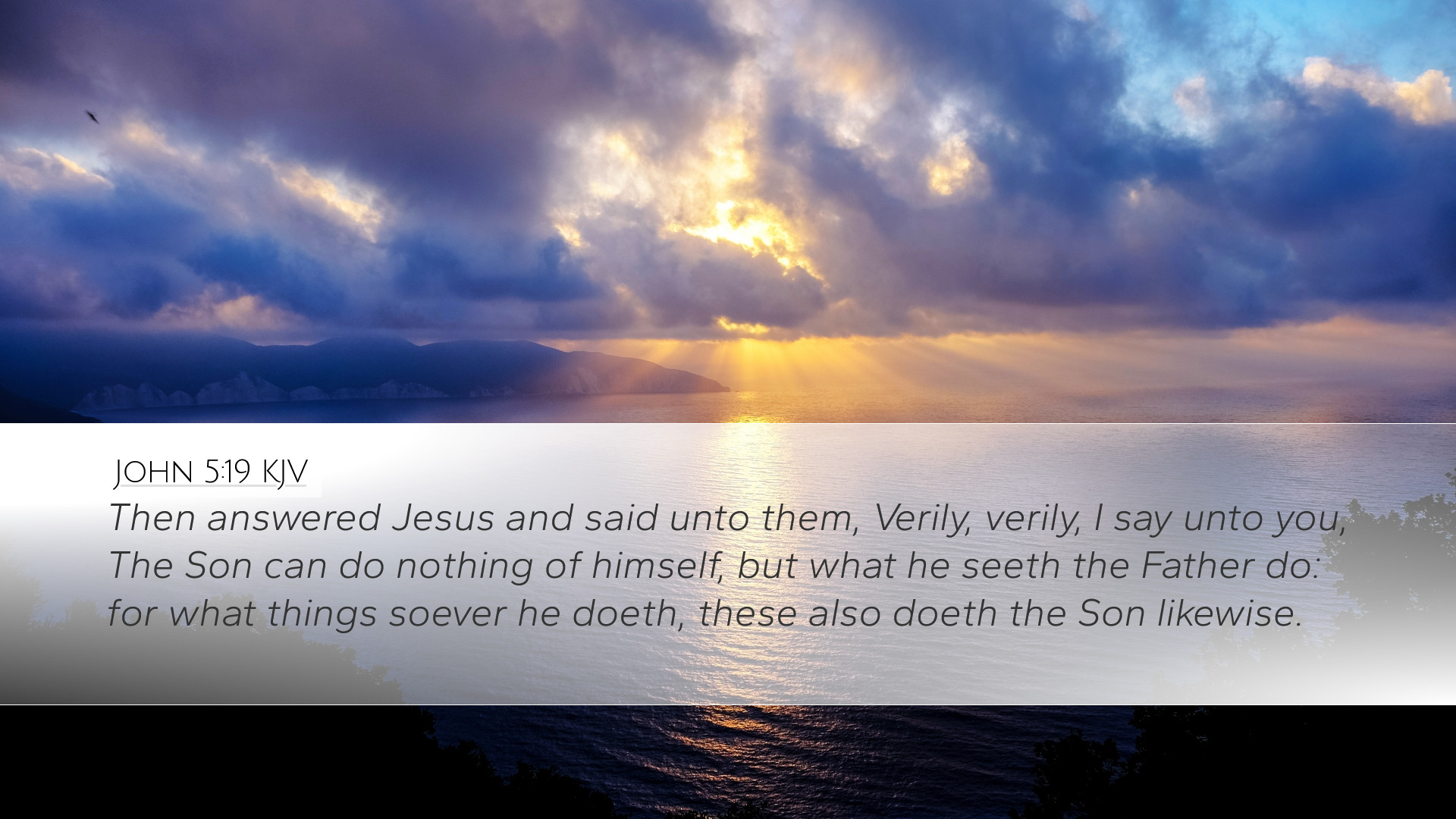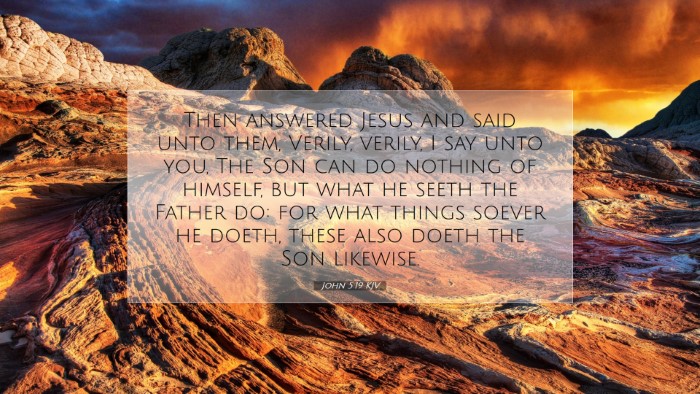Commentary on John 5:19
Verse: “Then answered Jesus and said unto them, Verily, verily, I say unto you, The Son can do nothing of himself, but what he seeth the Father do: for what things soever he doeth, these also doeth the Son likewise.” (John 5:19, KJV)
Introduction
John 5:19 is a pivotal verse in the discourse of Jesus, revealing profound insights into the relationship between the Father and the Son. This verse encapsulates essential theological themes regarding the nature of Christ, His divine mission, and the unity of purpose within the Trinity. In this commentary, we will draw from the insights of notable public domain theologians such as Matthew Henry, Albert Barnes, and Adam Clarke to enrich our understanding of this scripture.
Theological Significance
In this verse, Jesus emphasizes His dependence on the Father, which establishes a model of submission and obedience. As Henry points out, there is a mutual indwelling and cooperation within the Trinity, suggesting that all actions of the Son are in perfect harmony with the Father’s will. This relationship serves as a foundational truth in Christology, illuminating how Jesus, while fully divine, submitted to the will of the Father during His earthly ministry.
Matthew Henry's Perspective
Matthew Henry comments on the notion that “the Son can do nothing of himself.” He expounds upon the humility that Christ exhibits, despite being equal with God. This humility reflects His role in the redemptive plan and highlights the essence of His ministry: performing miracles and teaching in accordance with the Father’s revealed will. Henry elaborates on this idea by suggesting that even the most miraculous acts of Jesus were not self-driven but were carried out in obedience to the divine mission He had been given.
Albert Barnes' Insights
Albert Barnes elaborates on the implications of the phrase “but what he seeth the Father do.” He explains that this insight indicates a perfect communion between Jesus and the Father. Barnes emphasizes that Jesus' actions were not performed in isolation; rather, they were a revelation of the Father’s character and will. Every miracle and every teaching reflects divine authority and purpose, showcasing Jesus as the true representation of God on earth. Barnes concludes that the mutual involvement in action and will signifies the profound unity within the Godhead.
Adam Clarke's Interpretation
Adam Clarke provides a detailed analysis of the phrase “for what things soever he doeth, these also doeth the Son likewise.” Clarke emphasizes the importance of observing the Father’s works—not merely in a passive sense but as a deliberate alignment with the Father’s heart. He stresses that this verse reinforces the doctrine of the Trinity, illustrating a shared essence and unity in operation. For Clarke, understanding this relationship dispels any notion of a lesser deity in Christ; instead, it affirms His full participation in the divine will and acts.
Practical Applications
The implications of John 5:19 extend beyond theological discourse into practical aspects of the Christian life:
- Modeling Humility: The humility of Jesus should serve as a model for believers. Just as He submitted to the Father’s will, so too must Christians embrace the attitude of submission and obedience in their lives.
- Understanding Divine Purpose: The unity of purpose within the Trinity encourages believers to seek alignment with God’s will in their own decisions and actions, recognizing that their lives should reflect His character.
- Reflecting Christ: By observing the works of Christ and following His example, believers are called to act in ways that manifest God’s love and power in the world today.
Conclusion
John 5:19 serves as a profound theological statement regarding the nature of the relationship between Jesus Christ and God the Father. Through the insights of Matthew Henry, Albert Barnes, and Adam Clarke, we see a multidimensional approach to understanding the unity of will, the importance of obedience, and the model of humility presented by Christ. For pastors, students, theologians, and Bible scholars, this verse invites deep reflection on the character of God and the nature of our submission to His divine purpose.


